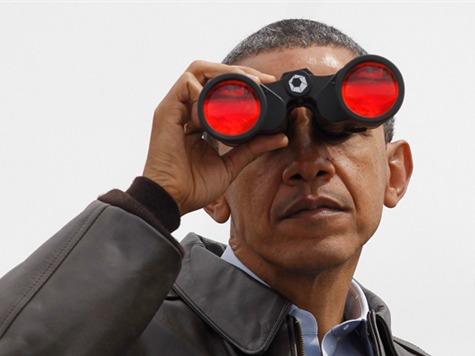In the wake of the deal reached in Geneva on Sunday on Iran’s nuclear program, much of the media’s initial excitement has given way to glum recognition that the agreement is little more than appeasement, inviting comparisons to the infamous Munich agreement of 1938. Conservative analysts have attempted to grapple with President Barack Obama’s motives: does he love the Iranian regime, or does he simply hate Israel?
Lee Smith at the Weekly Standard argues that Obama has been deliberately promoting Iran’s interests. He notes Obama’s acquiescence in a deal on Syria’s chemical weapons that protected the Iranian-backed Assad regime: “In short, Obama switched sides.” He even suggests that Obama’s decision to consult Congress over a military strike after a walk with his chief of staff was “a clever piece of stagecraft out of The West Wing.”
It is difficult to accept that an administration so risk-averse and incompetent could have pulled off such a thorough deception. (As Orwell said of Stalin: “I believe that in the future we shall come to feel that Stalin’s foreign policy, instead of being so diabolically clever as it is claimed to be, has been merely opportunistic and stupid.”) Moreover, Obama has sometimes blocked Iran: in Bahrain, for example, he allowed a Shia rebellion to be crushed. Yes, Obama has boosted Iran, but less by design than simply by downgrading U.S. leadership.
Caroline Glick of the Jerusalem Post argues bluntly: “The goal of Obama’s foreign policy is to weaken the State of Israel.” That is certainly the effect of his policy on Iran, and with respect to the Palestinians he has certainly tried to undermine the Israeli government. But there is contrary evidence both in Obama’s support for Israel’s missile defense programs, and in his recent trip to Israel, replete with symbolic solidarity.
Whatever Obama’s private feelings toward Israel may be, we must judge him by his actions. And the most telling with regard to Iran is that he sought to persuade Congress to abandon new sanctions before Geneva, not after. New sanctions–even if not yet signed into law–would have increased Obama’s leverage over Iran. It is clear, however, that Obama did not want the best deal. He simply wanted a deal–any deal Iran would sign.
Obama’s does not have “red lines” or clear principles. Like Obama’s other policies, his foreign policy is more a kind of posture: a preference for a humbler America, and a desire to avoid conflict if possible. He will act when forced–as in the bin Laden raid, or with Tuesday’s B-52 flight to warn China in Senkaku. But it is worth noting that the Navy Seals who rescued the Maersk Alabama crew in 2009 likely acted on their own initiative.
Our post-modern president comes from the academic and literary world, where real-world issues are reduced to semiotics. He took care to visit Yad Vashem and Mount Herzl but failed to internalize what those places mean to Israelis–namely, that weakness is incompatible with peace. He is all symbols, no commitments.
Obama’s distaste for commitment is ecumenical. He blamed Catholic schools for conflict in Northern Ireland, , and even refused to wear an American flag pin after 9/11. His philosophy would jibe with the internationalism of old-style communism–but like Saul Alinsky, he shunned any such formal alignment. He is a post-modern leftist, incapable of understanding, much less defeating, a pre-modern civilization with modern ambitions.

COMMENTS
Please let us know if you're having issues with commenting.